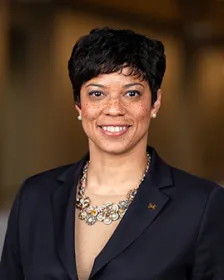Spotlight
Dr. Rebecca Hasson

Biography:
Rebecca Hasson is an Associate Professor of Movement Science and Director of the Childhood Disparities Research Laboratory at the U-M School of Kinesiology. She also holds an appointment as Associate Professor in the Department of Nutritional Sciences at the U-M School of Public Health. Her research focuses on identifying the causes and consequences of pediatric obesity in multiethnic populations, and examining the social and behavioral determinants that contribute to racial and ethnic differences in obesity-related disease risk. Dr. Hasson received her BA, MS, and PhD from the Department of Kinesiology at the University of Massachusetts, Amherst. After graduating, she completed a postdoctoral research fellowship at the University of Southern California’s Childhood Obesity Research Center, and a second postdoctoral fellowship at the University of California at San Francisco’s Center on Social Disparities in Health as a W.K. Kellogg Health Scholar.
What projects are you currently working on?
In collaboration with the Michigan Department of Education, the Michigan Department of Health and Human Services, the Michigan School Health Coordinators’ Association, and Blue Cross Blue Shield’s Building Healthy Communities Program, we are enhancing the implementation and reach of our classroom- and home-based physical activity interventions. With foundation and federal funding, we are using Sequential Multiple Assignment Randomized Trial (SMART) designs to evaluate the effectiveness, cost-effectiveness, and equity impacts of these interventions. Our goal is to generate data-driven insights that inform resource allocation, empowering decision-makers to implement tailored strategies that ensure high fidelity and meet the diverse needs of communities.
What led you to pursue childhood obesity research?
In exploring the pathophysiology of racial and ethnic health disparities, I became interested in identifying the most critical period in a person’s life when they are most vulnerable to the negative effects of their social environment. This curiosity led me to focus my research on childhood and adolescent obesity.
What do you like most about your job or what do you find most exciting about it?
What I find most exciting about my job is traveling across the state, visiting classrooms, and engaging with parents while seeing firsthand the joy children experience through our physical activity interventions. The most rewarding part is knowing that our work is making a real impact on the health and well-being of children in Michigan.
The Momentum Center is a cross-disciplinary research center. How have you drawn on your other experiences to do this kind of research?
With multidisciplinary training in exercise physiology, energy metabolism, pediatric endocrinology, health disparities, and social epidemiology, I bring a unique skill set to studying metabolic health disparities in pediatric populations. My public health training allows me to identify environmental factors contributing to these disparities, while my biomedical background enables me to explore the physiological mechanisms underlying differences in metabolic health during the critical period of adolescent growth. This combination of expertise uniquely prepares me to develop and disseminate evidence-based physical activity programs that address disparities in pediatric populations, ensuring that interventions are both scientifically grounded and community-responsive.
If you had unlimited time and resources to explore a research question, what would you want to study?
If I had unlimited time and resources, I would focus on the global dissemination and adaptation of our classroom- and home-based interventions to promote physical activity and health equity for children worldwide. I would study how our interventions can be tailored to different cultural, socioeconomic, and policy environments to ensure accessibility and sustainability across diverse settings. This research would explore the most effective strategies for scaling and integrating classroom- and home-based physical activity interventions into various education and public health systems, leveraging digital tools, community partnerships, and policy frameworks. By understanding the facilitators and barriers to implementation in different regions, we could create a global model for evidence-based physical activity programs that improve children’s health and well-being regardless of their geographic or socioeconomic background.
For more Members see the Member Spotlight Archive.

